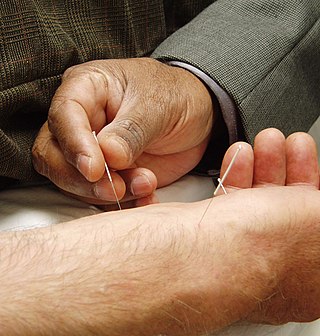
Acupuncture is a form of alternative medicine and a component of traditional Chinese medicine (TCM) in which thin needles are inserted into the body. Acupuncture is a pseudoscience; the theories and practices of TCM are not based on scientific knowledge, and it has been characterized as quackery.
Alternative medicine is any practice that aims to achieve the healing effects of medicine despite lacking biological plausibility, testability, repeatability, or evidence from clinical trials. Unlike modern medicine, which employs the scientific method to test plausible therapies by way of responsible and ethical clinical trials, producing repeatable evidence of either effect or of no effect, alternative therapies reside outside of medical science and do not originate from using the scientific method, but instead rely on testimonials, anecdotes, religion, tradition, superstition, belief in supernatural "energies", pseudoscience, errors in reasoning, propaganda, fraud, or other unscientific sources. Frequently used terms for relevant practices are New Age medicine, pseudo-medicine, holistic medicine, unorthodox medicine, fringe medicine, and unconventional medicine, with little distinction from quackery.
Reiki is a Japanese form of energy healing, a type of alternative medicine. Reiki practitioners use a technique called palm healing or hands-on healing through which a "universal energy" is said to be transferred through the palms of the practitioner to the patient in order to encourage emotional or physical healing.
The National Center for Complementary and Integrative Health (NCCIH) is a United States government agency which explores complementary and alternative medicine (CAM). It was initially created in 1991 as the Office of Alternative Medicine (OAM), and renamed the National Center for Complementary and Alternative Medicine (NCCAM) before receiving its current name in 2014. NCCIH is one of the 27 institutes and centers that make up the National Institutes of Health (NIH) within the United States Department of Health and Human Services.
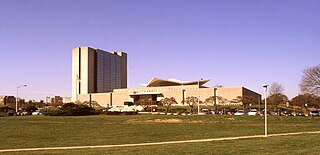
The United States National Library of Medicine (NLM), operated by the United States federal government, is the world's largest medical library.

Herbal medicine is the study of pharmacognosy and the use of medicinal plants, which are a basis of traditional medicine. With worldwide research into pharmacology, some herbal medicines have been translated into modern remedies, such as the anti-malarial group of drugs called artemisinin isolated from Artemisia annua, a herb that was known in Chinese medicine to treat fever. There is limited scientific evidence for the safety and efficacy of many plants used in 21st century herbalism, which generally does not provide standards for purity or dosage. The scope of herbal medicine sometimes include fungal and bee products, as well as minerals, shells and certain animal parts.
Manual therapy, or manipulative therapy, is a physical treatment primarily used by physical therapists, physiotherapists, occupational therapists to treat musculoskeletal pain and disability; it mostly includes kneading and manipulation of muscles, joint mobilization and joint manipulation. It is also used by Rolfers, massage therapists, athletic trainers, osteopaths, and physicians.
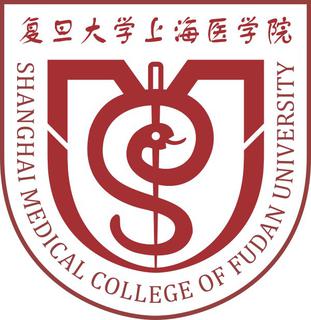
The Shanghai Medical College, Fudan University, formerly the independent Shanghai Medical University (SHMU), is one of the oldest and most prestigious medical schools in China. Clinical medicine of the Shanghai Medical College of Fudan University is consistently ranked among the top three medical schools in China and #45 globally by Times Higher Education World University Rankings as of 2022. Its "Clinical Medicine" also ranked #73 globally by the U.S. News & World Report globally.

The National University of Natural Medicine (NUNM) is a private university of naturopathic medicine and Classical Chinese medicine located in Portland, Oregon. The school has approximately 553 students.
Pharmacy in China involves the activities engaged in the preparation, standardization and dispensing of drugs, and its scope includes the cultivation of plants that are used as drugs, the synthesis of chemical compounds of medicinal value, and the analysis of medicinal agents. Pharmacists in China are responsible for the preparation of the dosage forms of drugs, such as tablets, capsules, and sterile solutions for injection. They compound physicians', dentists', and veterinarians' prescriptions for drugs. Pharmacological activities are also closely related to pharmacy in China.
Translational research is research aimed at translating (converting) results in basic research into results that directly benefit humans. The term is used in science and technology, especially in biology and medical science. As such, translational research forms a subset of applied research.
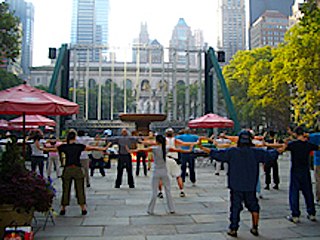
Qigong, qi gong, chi kung, chi 'ung, or chi gung is a system of coordinated body-posture and movement, breathing, and meditation used for the purposes of health, spirituality, and martial-arts training. With roots in Chinese medicine, philosophy, and martial arts, qigong is traditionally viewed by the Chinese and throughout Asia as a practice to cultivate and balance qi, translated as "life energy".
Jaseng Hospital of Korean Medicine is a network of hospitals for non-invasive treatment of spine and joint disorders in South Korea. It was designated as a 'Spine Specialized Oriental Medical Hospital' by the Korea Ministry of Health and also designated as a 'Health Tour' hospital for foreigners by the Korean Health Industry Development Institute (KHIDI).
The Office of Cancer Complementary and Alternative Medicine (OCCAM) is an office of the National Cancer Institute (NCI) in the Division of Cancer Treatment and Diagnosis. OCCAM was founded in 1998 and is responsible for NCI's research agenda in pseudoscientific complementary and alternative medicine (CAM), as it relates to cancer prevention, diagnosis, treatment, and symptom management. The OCCAM differs from the National Center for Complementary and Integrative Health in that it is exclusively focused on cancer, while the NCCIH funds a much broader program of NIH research into CAM for all diseases and disorders. It last produced an annual report in 2011 and spent $105 million on CAM research in 2011.
Shaanxi University of Science & Technology is a university located in Shaanxi province, China.
The Complementary and Alternative Medicine Program was created in 2003 by Georgetown University Medical Center in response to a nationwide NIH-funded educational initiative to incorporate CAM into medical and graduate school curricula. This program is focused on training students to objectively assess the safety and efficacy of various CAM modalities such as acupuncture, massage, herbs and supplements, and mind-body interactions and introducing scientific rigor to much needed research in this field.
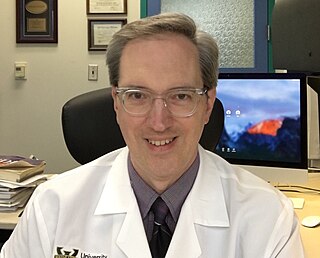
David Henry Gorski is an American surgical oncologist and professor of surgery at Wayne State University School of Medicine. He specializes in breast cancer surgery at the Karmanos Cancer Institute. Gorski is an outspoken skeptic and critic of alternative medicine and the anti-vaccination movement. A prolific blogger, he writes as Orac at Respectful Insolence, and as himself at Science-Based Medicine where he is the managing editor.
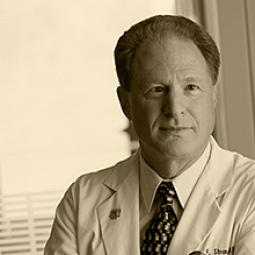
Stephen E. Straus was an American physician, immunologist, virologist and science administrator. He is particularly known for his research into human herpesviruses and chronic fatigue syndrome, and for his discovery of the autoimmune lymphoproliferative syndrome genetic disorder. He headed the Laboratory of Clinical Investigation of the National Institute of Allergy and Infectious Diseases, National Institutes of Health (NIH), and served as the founding director of the NIH's National Center for Complementary and Alternative Medicine.

Xiamen University Malaysia(abbreviated as XMUM) is a private university located in Bandar Sunsuria, Sepang, Selangor in Malaysia. It's the first overseas campus set up by a Chinese public university and the first Chinese university branch campus in Malaysia.
Alternative medicine describes any practice which aims to achieve the healing effects of medicine, but which lacks biological plausibility and is untested or untestable. Complementary medicine (CM), complementary and alternative medicine (CAM), integrated medicine or integrative medicine (IM), and holistic medicine are among many rebrandings of the same phenomenon.








